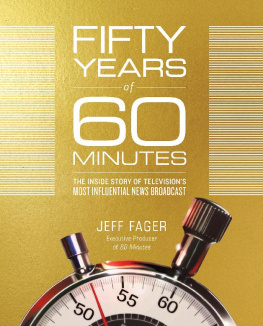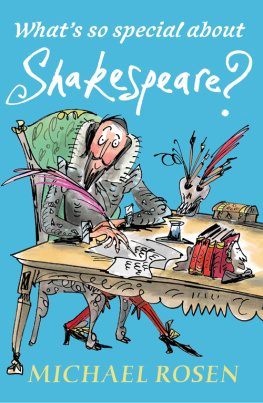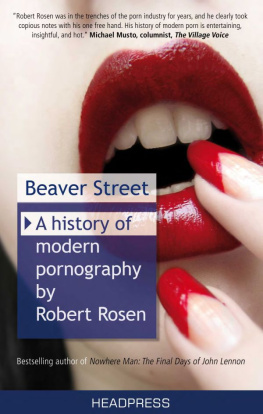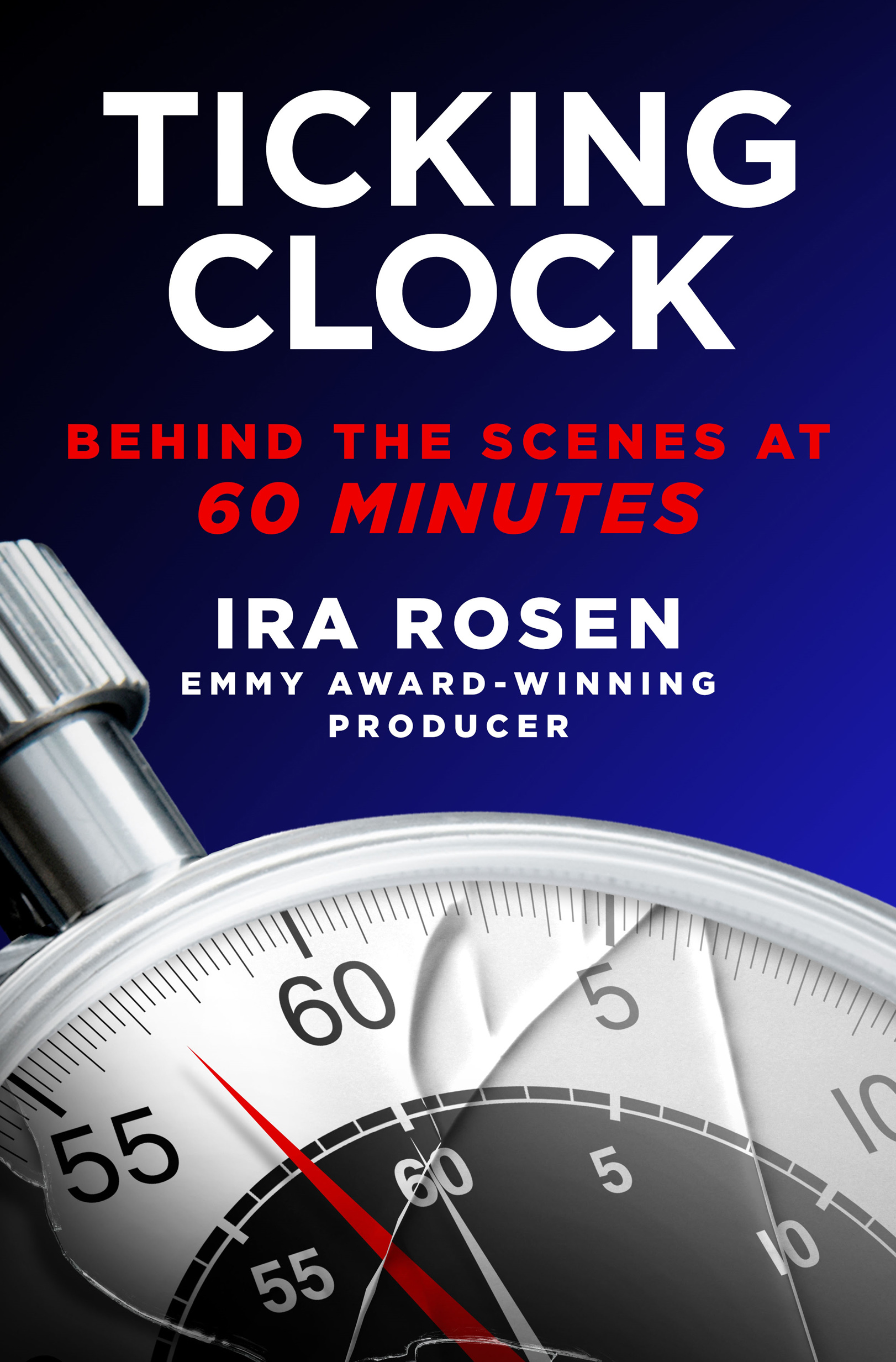The author and publisher have provided this e-book to you for your personal use only. You may not make this e-book publicly available in any way. Copyright infringement is against the law. If you believe the copy of this e-book you are reading infringes on the authors copyright, please notify the publisher at: us.macmillanusa.com/piracy.
When I began as a producer on 60 Minutes, there were no computers and no internet. The phones were rotary, and the newspapers from around the country came three days late. Stories were often found or assigned based on what was in The New York Times. I and other producers who didnt want Times retread stories would play airport roulette. The way its played is I would head to the airport and go to the first plane ticket counter I found. Id throw my credit card down and say, next flight out; even if the plane was going to Detroit and the one after it was going to more fun cities like Los Angeles or Las Vegas, I would go to Detroit. It was part of the karma of the chase.
When I got to Detroit, I would grab all the local newspapers to see if there was anything interesting going on. If there was, Id make a call or two and visit the person who was involved. If there were no 60 Minutesworthy stories, Id go back to the ticket counter and once again say, next plane out, and keep going, sometimes for days. We had an unlimited budget, so I could travel and stay in any hotel I wanted. Usually by the time I got back to New York, Id have a couple of really interesting ideas to pursue.
Though I would play airport roulette when I was desperately looking for a story, the most frequent destination I traveled to was Washington, D.C. The shuttle flights were open seating, and I would always try to board late to have my choice of seatmates. I would pick out politicians, cabinet members, or sometimes businessmen with a cache of interesting documents on their lap. After a fifty-minute airplane ride, even the most closemouthed, discreet bureaucrat would open up and provide me with stories or tips to pursue.
It was on one of those shuttle flights that my career almost ended. In 1982, I was working on my first major investigative story for 60 Minutes. It was an expos of how the U.S. government illegally permitted the entry into America of thousands of Nazi war criminals who committed atrocities in World War II, in exchange for their intelligence help in fighting the Soviets. It was an extraordinary smuggling operation conducted by the CIA in defiance of presidential orders.
I had carefully cultivated a source who gave me top secret documents that laid out the details of the operation. I convinced a former member of the Justice Departments unit that prosecuted Nazis to become a whistleblower and go on-camera about the smuggling operations. And I located some of the Nazis, one living a few miles from the 60 Minutes offices in the Bronx, and another working at Radio Free Europe.
Proud of myself for making all the right moves, I was lost in daydreaming about all the compliments and awards I would receive as I boarded the shuttle flight at LaGuardia Airport, to meet correspondent Mike Wallace for an interview with the whistleblower, John Loftus.
I was less than two years into the job, still on probation, but I hoped this story would get me a permanent position. This was the story that I felt would show everyone at 60 Minutes that I belonged. On the flight I worked on the interview questions and a script for the story. After the plane landed, I descended the ramp and felt the wonderful warm spring day sun. I relaxed for a moment until I saw the marble obelisk of the Washington Monument. Out of habit, I had flown to Washington, as I had done countless times before. The problem was, I was supposed to be in Boston.
No one had checked my ticket at the New York airport and I had tuned out all the announcements made on the plane. I was in Washington when Mike Wallace was on his way to Boston. Wallace was the shows top correspondent; he didnt have the patience to wait for a urinal to open in a crowded bathroom. I thought, He will kill me, then fire me, though maybe not in that order.
I ran back into the terminal, found a flight to Boston, and purchased a ticket at the gate.
Cell phones were not yet invented, so I ran to a phone booth and threw in quarters. I called the cameraman and said I had an emergency and I was running late. Tell Wallace, but dont start without me, I said. Then I hung up and quickly boarded the plane. I didnt want a cameraman to explain why the twenty-eight-year-old producer just ended up in the wrong airport.
The Eastern flight slowly taxied on the runway.
Faster, faster, I thought.
After a slight delay, the plane took off. In the air it seemed to be flying at half speed.
I couldnt contain myself. I got up and went to the cockpit door. This was way before 9/11; pilots would sometimes leave the door open and even give impromptu tours while the plane was in the air.
I knocked, and a pilot pushed the door open.
Hi, my name is Ira and I am a 60 Minutes producer. I boarded the wrong flight this morning and ended up in Washington when I should have been in Boston. Mike Wallace is waiting for me and I am really late. Is there any way you guys could fly faster so I wont lose my job?
The pilots looked at each other. I think at first they thought I was joking, but they soon realized I was serious.
You want us to fly faster? one pilot asked.
Yes. Even five minutes sooner would make a huge difference. Mike Wallace has no patience and he will fire me.
We will see what we can do, the pilot said.
I went back to my seat and I heard the engine revving louder. The plane seemed to actually be flying faster.
We landed fifteen minutes early. I ran to a pay phone and called Wallace.
I explained what happened. You better get your ass here fast, he said, but he didnt fire me. Turns out being late had worked in my favor. Mike spent his time taking pictures and signing autographs for the law firm staff. The adulation from strangers was like a drug for him and put him in a good mood. I survived that day, but there would be many other more precarious days to come.
When our story aired a few weeks later, it made front-page news in nearly every paper in the country and would lead to my first Emmy. But, more important, I had earned my first Hey, Mildred compliment from executive producer and 60 Minutes creator Don Hewitt. Mildred was the name of Hewitts high school sweetheart. He used her name interchangeably to compliment a story or to say it was too complicated for Mildred to understand. In this case he used the Hey, Mildred to say the Nazi story would get a viewer to jump up and shout to his wife or companion a Hey, Mildred, come over here and watch this story, you wont believe it. Thats what Hewitt wanted a TV couch potato to say when 60 Minutes was on. It was the job of producers like me to find those stories.
Over the ensuing years I would earn quite a few Hey, Mildreds. I received more awards than almost any producer in TV news, including multiple Peabody and duPont Awards, and twenty-four Emmys. I won six Investigative Reporters and Editors Awards, more than












